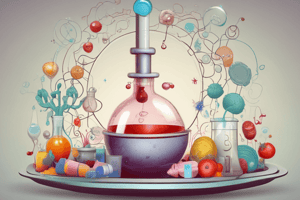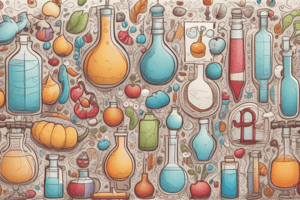Podcast
Questions and Answers
What is the origin of the term 'carbohydrate'?
What is the origin of the term 'carbohydrate'?
- From the combination of carbon and water (correct)
- From the observation of sugar consumption
- From the study of plant cell structure
- From the discovery of starches in food
What is the primary source of energy in the human body?
What is the primary source of energy in the human body?
- Carbohydrates (correct)
- Fats
- Proteins
- Vitamins
What is the function of carbohydrates in animal and plant cells?
What is the function of carbohydrates in animal and plant cells?
- To provide structural support (correct)
- To provide energy
- To regulate hormones
- To aid in digestion
What is the definition of a monosaccharide?
What is the definition of a monosaccharide?
What is the result of acid hydrolysis of polysaccharides?
What is the result of acid hydrolysis of polysaccharides?
How are oligosaccharides characterized?
How are oligosaccharides characterized?
What is the classification of carbohydrates based on the number of sugar units?
What is the classification of carbohydrates based on the number of sugar units?
What is the characteristic of hexoses?
What is the characteristic of hexoses?
What is the approximate energy yield from the oxidation of one gram of carbohydrate?
What is the approximate energy yield from the oxidation of one gram of carbohydrate?
What happens to excess glucose when liver and muscle glycogen reserves are filled?
What happens to excess glucose when liver and muscle glycogen reserves are filled?
What is the primary source of glucose for the body after meals?
What is the primary source of glucose for the body after meals?
What is the main pathway of glucose utilization in tissues?
What is the main pathway of glucose utilization in tissues?
What is the threshold above which glucose is excreted in urine?
What is the threshold above which glucose is excreted in urine?
What is the source of glucose for muscles during exercise?
What is the source of glucose for muscles during exercise?
What is the primary function of carbohydrates in the body?
What is the primary function of carbohydrates in the body?
What type of carbohydrate is found in plant cell walls and is mostly indigestible?
What type of carbohydrate is found in plant cell walls and is mostly indigestible?
What is the process of transforming small molecules into bigger molecules constituting the body structures and machinery?
What is the process of transforming small molecules into bigger molecules constituting the body structures and machinery?
What is the breakdown of large molecules into smaller molecules or reducing equivalents to produce energy?
What is the breakdown of large molecules into smaller molecules or reducing equivalents to produce energy?
What is the final product of carbohydrate digestion in the GIT?
What is the final product of carbohydrate digestion in the GIT?
Which of the following is an example of an amphibolic pathway?
Which of the following is an example of an amphibolic pathway?
What is the classification of fiber based on?
What is the classification of fiber based on?
Which of the following is NOT a type of carbohydrate?
Which of the following is NOT a type of carbohydrate?
Where does the Krebs cycle occur?
Where does the Krebs cycle occur?
What is the net ATP production from the complete oxidation of one glucose molecule?
What is the net ATP production from the complete oxidation of one glucose molecule?
Where does the digestion of carbohydrates start?
Where does the digestion of carbohydrates start?
What is the purpose of glycogenesis?
What is the purpose of glycogenesis?
What is the primary function of salivary amylase in the mouth?
What is the primary function of salivary amylase in the mouth?
What is the reason for the temporary halt in carbohydrate digestion in the stomach?
What is the reason for the temporary halt in carbohydrate digestion in the stomach?
What is the main function of the hexose monophosphate pathway (HMP) or pentose phosphate pathway (PPP)?
What is the main function of the hexose monophosphate pathway (HMP) or pentose phosphate pathway (PPP)?
During a brief fast, where does glucose come from?
During a brief fast, where does glucose come from?
What is the final product of starch digestion in the small intestine?
What is the final product of starch digestion in the small intestine?
What is the role of the liver, pancreas, and other endocrine glands in regulating carbohydrate metabolism?
What is the role of the liver, pancreas, and other endocrine glands in regulating carbohydrate metabolism?
How are monosaccharides absorbed into the bloodstream?
How are monosaccharides absorbed into the bloodstream?
What is the fate of absorbed fructose and galactose in the liver?
What is the fate of absorbed fructose and galactose in the liver?
What is the role of pancreatic amylase in the small intestine?
What is the role of pancreatic amylase in the small intestine?
What is the primary site of carbohydrate absorption?
What is the primary site of carbohydrate absorption?
Flashcards are hidden until you start studying
Study Notes
Carbohydrates
- Carbohydrates include sugars, starches, and fibers found in foods such as bread, pasta, and rice.
- The term "carbohydrate" comes from the observation that when sugars are heated, they produce carbon and water (hydrate of carbon).
Importance of Carbohydrates
- Primary source of energy for the body.
- Important structural components in animal and plant cells.
- Key components of nucleic acids, free nucleotides, and coenzymes.
- Major antigens are carbohydrates in nature, e.g., blood group substance.
- Play a biological role as part of hormones and their receptors and enzymes.
Classification of Carbohydrates
- Monosaccharides (simple sugars): contain one sugar unit, cannot be further hydrolyzed, and represent the end products of carbohydrate digestion in the human body.
- Oligosaccharides: contain 2-10 monosaccharide units per molecule and give monosaccharides on acid hydrolysis.
- Polysaccharides: contain more than 10 monosaccharide units per molecule and give monosaccharides on acid hydrolysis.
Monosaccharides
- Classified according to the number of carbon atoms into five important groups.
- Hexoses: monosaccharides containing 6 carbon atoms, help maintain blood glucose, and are an important source of "quick energy" during exercise.
Fiber
- Mostly indigestible carbohydrate.
- Component of plant cell walls.
- Classified according to solubility in water.
- Abundant in whole grains, legumes, fruits, and vegetables.
Carbohydrate Metabolism
- Includes digestion, absorption, utilization, and excretion of carbohydrates.
- Digestion involves the breakdown of carbohydrates into simpler molecules.
- Absorption involves the uptake of digested carbohydrates into the bloodstream.
- Utilization involves the conversion of absorbed carbohydrates into energy or storage forms.
- Excretion involves the removal of excess glucose from the body.
Digestion and Absorption of Carbohydrates
- Digestion starts in the mouth with salivary amylase, which breaks down starch into dextrin and maltose.
- In the stomach, digestion halts temporarily due to the high acidity, which inactivates salivary amylase.
- In the small intestine, pancreatic amylase completes the digestion of carbohydrates into monosaccharides.
- Monosaccharides are absorbed into the bloodstream through active transport against a concentration gradient.
Fate of Absorbed Monosaccharides
- In the liver, fructose and galactose are converted to glucose.
- Glucose is utilized by the body through oxidation to produce energy, conversion to other substances, storage as glycogen or fat, or excretion in urine.
Sources of Glucose to the Human Body
- Carbohydrates in the diet are the primary source of glucose for the body.
- Glycogen stored in the liver and muscles can be degraded to yield glucose during fasting or exercise.
- Glucose can also be synthesized from non-carbohydrate sources through gluconeogenesis.
ATP Production
- Complete oxidation of one glucose molecule results in a net production of 38 ATP molecules.
- Aerobic glycolysis produces 8 ATP, oxidative decarboxylation produces 6 ATP, and the Krebs cycle produces 24 ATP.
Krebs Cycle
- Final common pathway for the oxidation of carbohydrates, fatty acids, and amino acids.
- Occurs in the mitochondria and is aerobic.
Glycogenesis and Glycogenolysis
- Glycogenesis: synthesis of glycogen from glucose in the liver and muscles.
- Glycogenolysis: degradation of glycogen into glucose in the liver and muscles.
Hexose Monophosphate Pathway (HMP) or Pentose Phosphate Pathway (PPP)
- Important source of NADPH for reductive syntheses.
- Source of metabolically active ribose for nucleic acid synthesis.
Regulation of Carbohydrate Metabolism
- The liver, pancreas, and other endocrine glands are involved in controlling blood glucose concentrations.
- During fasting, glucose is supplied to the extracellular fluid from the liver through glycogenolysis and gluconeogenesis.
Studying That Suits You
Use AI to generate personalized quizzes and flashcards to suit your learning preferences.




